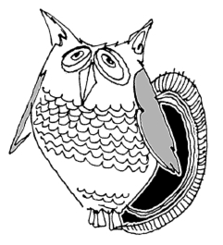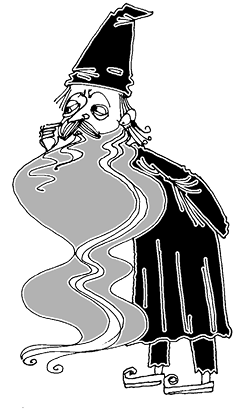Table of Contents
5
Should Wizard Hit Mommy?
John Updike
Before you read
Here is a story about the worldview of a little child, and the difficult moral question she raises during the story session with her father.
In the evenings and for Saturday naps like today’s, Jack told his daughter Jo a story out of his head. This custom, begun when she was two, was itself now nearly two years old, and his head felt empty. Each new story was a slight variation of a basic tale: a small creature, usually named Roger (Roger Fish, Roger Squirrel, Roger Chipmunk), had some problem and went with it to the wise old owl. The owl told him to go to the wizard, and the wizard performed a magic spell that solved the problem, demanding in payment a number of pennies greater than the number that Roger Creature had, but in the same breath directing the animal to a place where the extra pennies could be found. Then Roger was so happy he played many games with other creatures, and went home to his mother just in time to hear the train whistle that brought his daddy home from Boston. Jack described their supper, and the story was over. Working his way through this scheme was especially fatiguing on Saturday, because Jo never fell asleep in naps any more, and knowing this made the rite seem futile.
Read and find out
Who is Jo? How does she respond to her father’s story-telling?
“Roger...” Jo squeezed her eyes shut and smiled to be thinking she was thinking. Her eyes opened, her mother’s blue. “Skunk,” she said firmly.
A new animal; they must talk about skunks at nursery school. Having a fresh hero momentarily stirred Jack to creative enthusiasm. “All right,” he said. “Once upon a time, in the deep dark woods, there was a tiny little creature by the name of Roger Skunk. And he smelled very bad.”
“Yes,” Jo said.
“He smelled so bad that none of the other little woodland creatures would play with him.” Jo looked at him solemnly; she hadn’t foreseen this. “Whenever he would go out to play,” Jack continued with zest, remembering certain humiliations of his own childhood, “all of the other tiny animals would cry, “Uh-oh, here comes Roger Stinky Skunk,” and they would run away, and Roger Skunk would stand there all alone, and two little round tears would fall from his eyes.” The corners of Jo’s mouth drooped down and her lower lip bent forward as he traced with a forefinger along the side of her nose the course of one of Roger Skunk’s tears.
“Won’t he see the owl?” she asked in a high and faintly roughened voice.
Sitting on the bed beside her, Jack felt the covers tug as her legs switched tensely. He was pleased with this moment — he was telling her something true, something she must know — and had no wish to hurry on. But downstairs a chair scraped, and he realised he must get down to help Clare paint the living-room woodwork.
“Well, he walked along very sadly and came to a very big tree, and in the tiptop of the tree was an enormous wise old owl.”
“Good.”
“Mr Owl,” Roger Skunk said, “all the other little animals run away from me because I smell so bad.” “So you do,” the owl said. “Very, very bad.” “What can I do?” Roger Skunk said, and he cried very hard.

“The wizard, the wizard,” Jo shouted, and sat right up, and a Little Golden Book spilled from the bed.
“Now, Jo. Daddy’s telling the story. Do you want to tell Daddy the story?”
“No. You me.”
“Then lie down and be sleepy.”
Her head relapsed onto the pillow and she said, “Out of your head.”
“Well. The owl thought and thought. At last he said, “Why don’t you go see the wizard?”
“Daddy?”
“What?”
“Are magic spells real ?” This was a new phase, just this last month, a reality phase. When he told her spiders eat bugs, she turned to her mother and asked, “Do they really?” and when Clare told her God was in the sky and all around them, she turned to her father and insisted, with a sly yet eager smile, “Is He really?”
“They’re real in stories,” Jack answered curtly. She had made him miss a beat in the narrative. “The owl said, “Go through the dark woods, under the apple trees, into the swamp, over the crick —”
“What’s a crick?”
“I know it,” Roger Skunk said, “and all the little animals run away from me. The enormous wise owl said you could help me.”
“Eh? Well, maybe. Come on in. Don’t get too close.” Now, inside, Jo, there were all these magic things, all jumbled together in a big dusty heap, because the wizard did not have any cleaning lady.”
“Why?”
“Why? Because he was a wizard, and a very old man.”

“Will he die?”
“No. Wizards don’t die. Well, he rummaged around and found an old stick called a magic wand and asked Roger Skunk what he wanted to smell like. Roger thought and thought and said, “Roses.”
“Yes. Good,” Jo said smugly.
Jack fixed her with a trance like gaze and chanted in the wizard’s elderly irritable voice:
“Abracadabry, hocus-poo,
Roger Skunk, how do you do,
Roses, boses, pull an ear,
Roger Skunk, you never fear:
Bingo!”
He paused as a rapt expression widened out from his daughter’s nostrils, forcing her eyebrows up and her lower lip down in a wide noiseless grin, an expression in which Jack was startled to recognise his wife feigning pleasure at cocktail parties. “And all of a sudden,” he whispered, “the whole inside of the wizard’s house was full of the smell of — roses! ‘Roses!’ Roger Fish cried. And the wizard said, very cranky, “That’ll be seven pennies.”
“Daddy.”
“What?”
“Roger Skunk. You said Roger Fish.”
“Yes. Skunk.”
“You said Roger Fish. Wasn’t that silly?”
“Very silly of your stupid old daddy. Where was I? Well, you know about the pennies.”
“Say it.”
“So the wizard said, ‘Oh, very well. Go to the end of the lane and turn around three times and look down the magic well and there you will find three pennies. Hurry up.’ So Roger Skunk went to the end of the lane and turned around three times and there in the magic well were three pennies! So he took them back to the wizard and was very happy and ran out into the woods and all the other little animals gathered around him because he smelled so good. And they played tag, baseball, football, basketball, lacrosse, hockey, soccer, and pick-up-sticks.”
“What’s pick-up-sticks?”
“It’s a game you play with sticks.”
“Like the wizard’s magic wand?”
“Kind of. And they played games and laughed all afternoon and then it began to get dark and they all ran home to their mommies.”
Jo was starting to fuss with her hands and look out of the window, at the crack of day that showed under the shade. She thought the story was all over. Jack didn’t like women when they took anything for granted; he liked them apprehensive, hanging on his words. “Now, Jo, are you listening?”
“Yes.”
“Because this is very interesting. Roger Skunk’s mommy said, ‘What’s that awful smell?’
“Wha-at?”
Read and find out
What possible plot line could the story continue with?
“And, Roger Skunk said, ‘It’s me, Mommy. I smell like roses.’ And she said, ‘Who made you smell like that?’ And he said, ‘The wizard,’ and she said, ‘Well, of all the nerve. You come with me and we’re going right back to that very awful wizard.”
Jo sat up, her hands dabbling in the air with genuine fright. “But Daddy, then he said about the other little animals run away!” Her hands skittered off, into the underbrush.
“All right. He said, ‘But Mommy, all the other little animals run away,’ and she said, ‘I don’t care. You smelled the way a little skunk should have and I’m going to take you right back to that wizard,’ and she took an umbrella and went back with Roger Skunk and hit that wizard right over the head.”
“No,” Jo said, and put her hand out to touch his lips, yet even in her agitation did not quite dare to stop the source of truth. Inspiration came to her. “Then the wizard hit her on the head and did not change that little skunk back.”
“No,” he said. “The wizard said ‘O.K.’ and Roger Skunk did not smell of roses any more. He smelled very bad again.”
“But the other little amum — oh! — amum — ”
“Joanne. It’s Daddy’s story. Shall Daddy not tell you any more stories?” Her broad face looked at him through sifted light, astounded. “This is what happened, then. Roger Skunk and his mommy went home and they heard Woo-oo, woooo-oo and it was the choo-choo train bringing Daddy Skunk home from Boston. And they had lima beans, celery, liver, mashed potatoes, and Pie-Oh-My for dessert. And when Roger Skunk was in bed Mommy Skunk came up and hugged him and said he smelled like her little baby skunk again and she loved him very much. And that’s the end of the story.”
“But Daddy.”
“What?”
“Then did the other little animals run away?”
“No, because eventually they got used to the way he was and did not mind it at all.”
Read and find out
What do you think was Jo’s problem?
“What’s evenshiladee?”
“In a little while.”
“That was a stupid mommy.”
“It was not,” he said with rare emphasis, and believed, from her expression, that she realised he was defending his own mother to her, or something as odd. “Now I want you to put your big heavy head in the pillow and have a good long nap.” He adjusted the shade so not even a crack of day showed, and tiptoed to the door, in the pretense that she was already asleep. But when he turned, she was crouching on top of the covers and staring at him. “Hey. Get under the covers and fall faaast asleep. Bobby’s asleep.”
“What?”
“Tomorrow, I want you to tell me the story that that wizard took that magic wand and hit that mommy” — her plump arms chopped forcefully — “right over the head.”
“No. That’s not the story. The point is that the little skunk loved his mommy more than he loved all the other little animals and she knew what was right.”
“No. Tomorrow you say he hit that mommy. Do it.” She kicked her legs up and sat down on the bed with a great heave and complaint of springs, as she had done hundreds of times before, except that this time she did not laugh. “Say it, Daddy.”
“Well, we’ll see. Now at least have a rest. Stay on the bed. You’re a good girl.”
He closed the door and went downstairs. Clare had spread the newspapers and opened the paint can and, wearing an old shirt of his on top of her maternity smock, was stroking the chair rail with a dipped brush. Above him footsteps vibrated and he called, “Joanne! Shall I come up there and spank you?” The footsteps hesitated.
“That was a long story,” Clare said.
“The poor kid,” he answered, and with utter weariness watched his wife labour. The woodwork, a cage of moldings and rails and baseboards all around them, was half old tan and half new ivory and he felt caught in an ugly middle position, and though he as well felt his wife’s presence in the cage with him, he did not want to speak with her, work with her, touch her, anything.
Reading with Insight
1. What is the moral issue that the story raises?
2. How does Jo want the story to end and why?
3. Why does Jack insist that it was the wizard that was hit and not the mother?
4. What makes Jack feel caught in an ugly middle position?
5. What is your stance regarding the two endings to the Roger Skunk story?
6. Why is an adult’s perspective on life different from that of a child’s?
